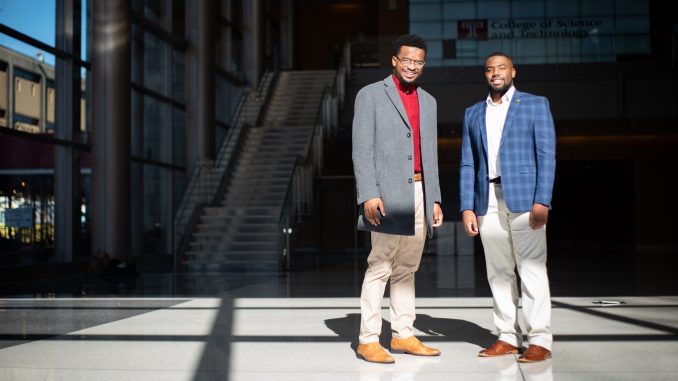
At Kevin Jackson’s first summer engineering internship, he found himself surrounded by mostly white peers.
On his first day, his peers assumed he was a part of a manual labor division of the internship rather than the engineering division, he said.
“This hurt me a lot because I knew I had the capability to do the tasks for engineering, but they all thought that I was in for a less rigorous program,” said Jackson, a senior electrical engineering major and vice president of Temple’s chapter of the National Society of Black Engineers. “From that day forward, I decided to push harder and just try hard to keep myself on the same level or higher as the white kids on my floor.”
NSBE is one of many Black professional groups on Temple’s campus created to give Black college students a welcoming and non-discriminatory environment to study, network and make friends in their career fields of choice.
Other Black professional groups at Temple include the Black Professional Health Association, the Temple Association of Black Journalists, the Black Public Relations Society, the Black Law Students Association and the Association of Black Psychologists, or ABPsi.
ABPsi’s Temple chapter was founded last year by its president Briayanna Johnson, a senior psychology and Africology and African American studies major.
“These organizations are so essential because we’re creating structures and networks of support and resources that do not exist otherwise,” Johnson said. “The pre-existing student organizations for psychology were mostly white. People didn’t look like myself, people didn’t understand certain challenges and obstacles that I faced not only as a Black student at a university but as an aspiring professional.”
A report by the United States Equal Employment Opportunity Commission states that networking opportunities for African Americans, like the ones provided by Black professional groups, are vital to creating a diverse workplace.
Corey Bennett, a senior mechanical engineering major and NSBE’s president, said being in a racial minority in college can feel isolating.
“Sometimes it could be very discouraging sitting in class and looking to your left and right and you’re the only African American in the class,” he added.
Temple is commonly called a predominantly white institution or a PWI. PWIs are colleges where the student body population is at least 50 percent white. Temple’s student body is 53.4 percent white, according to a 2019-20 report by Temple’s Office of Institutional Research and Assessment.
Seeing more Black professionals can motivate college students, Bennett said.
“In the College of Engineering, there aren’t that many African Americans, but when you go to our general body meetings or when you go to our conferences, you’ll see tens of thousands of Black engineers,” Bennett added. “So that presence is very beneficial because it will give them that push to keep striving for their goals.”
In 2016, African Americans received 7.6 percent of bachelor’s degrees in science, technology, engineering and mathematics and 4.5 percent of doctorates in STEM, the U.S. Department of Education reported.
Less than 2 percent of African American freshmen enter college having declared an engineering major, the Pittsburgh Post-Gazette reported.
Being a part of NSBE and seeing other Black engineers is “very empowering,” Jackson said.
“Growing up, I never saw a Black engineer until I got to college,” Jackson added. “Creating that space so people know they aren’t alone in the field of engineering is very important.”
Black graduates of historically Black colleges and universities had vastly different experiences than Black graduates of PWIs, according to a 2015 Gallup poll. Only 25 percent of PWI graduates felt the professors at their college cared about them as a person, as opposed to 58 percent of HBCU graduates. In addition, 35 percent of HBCU graduates said they felt supported in college, while only 12 percent of PWI graduates felt the same way.
ABPsi’s supportive and fun group dynamic lends itself to its growing membership, Johnson said.
“We get along so well, and that’s why people want to become members,” Johnson said. “They say, ‘Hey, I see you guys are doing the club on campus. I see the relationship you guys have, and it looks like you’re having fun while doing good things not only in the community but on campus. So how can I be a part of that?’”
Being a part of a Black professional group helped Johnson gain confidence in her own abilities, she added.
“I go into interviews a lot more confidently,” Johnson said. “When it came time for me to apply to certain positions for myself, I came in with that certain level of confidence that I didn’t have before because I know that I’m qualified.”



Be the first to comment